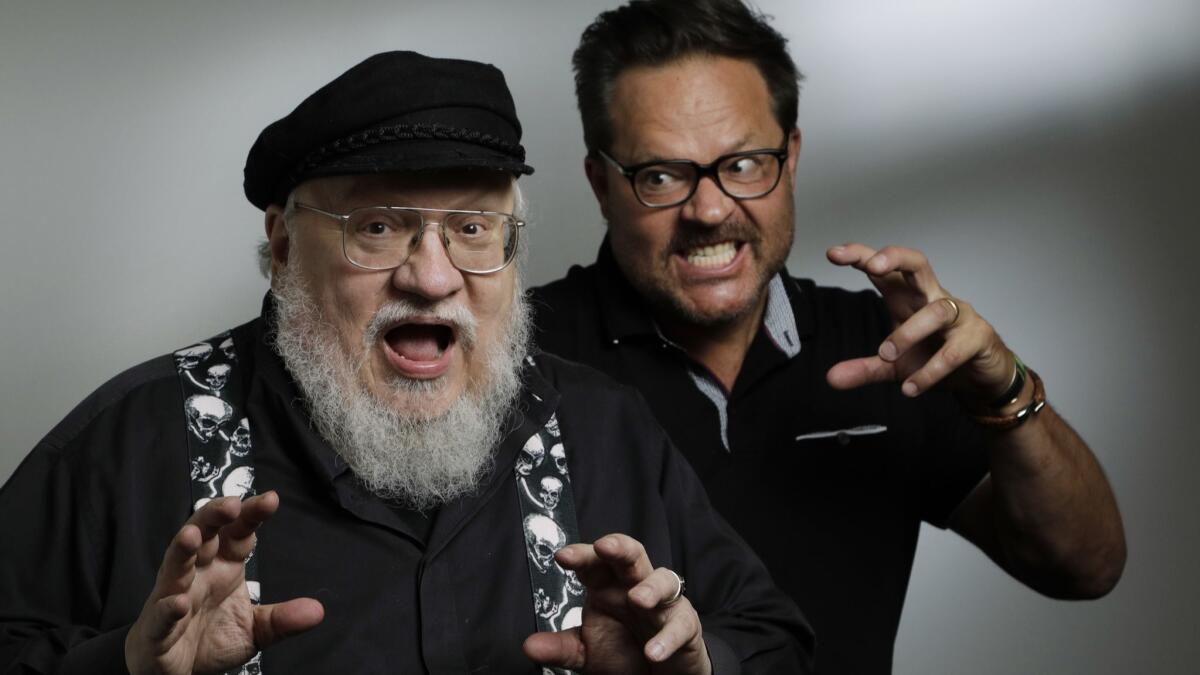George R.R. Martin returns to a whole new world with ‘Nightflyers’ on Syfy

- Share via
Only a few days removed from this year’s Emmys, George R.R. Martin was feeling a bit tired.
It had been another big night for the “Game of Thrones” writer, whose intricate “A Song of Ice and Fire” novels continued their run of prestige TV dominance. Adapted by David Weiss and David Benioff into a beloved HBO series, “Game of Thrones” has earned the network a gaudy 47 awards over a run that this year included best drama series.
Martin is still involved with “Game of Thrones,” including plans for prequels for HBO and finishing the highly anticipated next installment of his book series (“Winds of Winter,” which has no release date). But he’s also moved on to his next big TV project born of his imagination, “Nightflyers.”
Premiering Sunday on Syfy with a new installment airing every night through Dec. 6 (the other five of its 10 episodes air the following week), “Nightflyers” is based on a novella Martin first published in 1980. It was adapted by showrunner Jeff Buhler, who also adapted new versions of Stephen King’s “Pet Sematary” and Adrian Lyne’s cult 1990 film “Jacob’s Ladder.”
On this day the series producers hosted Martin for a screening of the first episode at NBC’s Universal City offices. Below is an edited conversation with Martin and Buhler about how the novella came to TV, the merging of horror with sci-fi and that little HBO series that starts its final season in April.
How did this series come together?
Buhler: I was approached by two wonderful friends and producers — we had done a reboot of “Jacob’s Ladder,” which is coming out in February. They approached me with the novella, the 30,000-word version [published in an expanded form in 1983, three years after the original shorter one]. I think it was a mistake to read it backwards, I should’ve started with the shorter one and then moved on to the longer one.
Martin: Probably. Or you could’ve just skipped the shorter one.
Buhler: The thing that struck me immediately was there was an open-ended or Lovecraftian quality to it, in that there are a lot more questions than answers that are presented in the story; that it felt like it could go on.
George, “Nightflyers” had already been adapted into a movie in 1987 — were you surprised to see it come back around?
Martin: Yes. It was a movie that meant a lot to me personally. I thought my career was dying as a writer because I had a book that hadn’t sold and I couldn’t sell another book and all that. But the movie came and went within a week, not many people saw it. It has its virtues, I think, but it’s not “Citizen Kane” or even “Alien” or “Star Wars.”
Then I forgot about it for 30 years. Then I was told that, oh, they’re developing that over at Syfy for a TV series and I was like, “What?”
Buhler: We ambushed him. We pulled him in like “The Godfather.”
Martin: When they first told me, I said, “How can they make that a TV show?” The novella and the movie are very much beginning, middle and end. You know, everybody dies. It would be a short TV show because it would be an empty ship with a lot of corpses on it.
Buhler: That’s exactly what happens, by the way. It’s in the pilot [Laughs].
Martin: A lot of clever invention and things have gone into it, and it’s exciting. I just saw it for the first time here, so that’s cool.
Buhler: I was not watching the screen. I was watching George. It’d be, “He strokes the beard three times, there’s a finger press — that’s a maybe.” You’ve gotta read the body language.
For a number of years you’ve been involved with the making of “Game of Thrones” as well. Was it strange coming to this series from that experience?
Martin: Yeah, I guess. Even on “Game of Thrones,” David Benioff and [David] Weiss are the showrunners. … I visited the set once or twice a year in the early years but I haven’t done that in a number of years, I’m trying to get the books done. So even in that case I’m not as involved.
But hopefully I can still exert some sort of influence on some of these, and it’s a case of trusting your babies to people you hope will raise them right and not abuse them [Laughs]. So far so good, I’ve been lucky.
Will fans of “Game of Thrones” find something familiar in “Nightflyers”?
Martin: Hopefully they’ll find, number one, surprises. I don’t like television or books or movies that are too predictable. I try to take my readers by surprise, not to just do the same story they’ve done a thousand times before. I think “Nightflyers” the novella has some of that, and I think these guys are capturing some of that. They’re even surprising me.
Buhler: Space dragons [Laughs].
Martin: The other thing that is important to me is the characters. I often quote Faulkner, who in his Nobel Prize acceptance speech said the human heart in conflict with itself is the only thing worth writing about. That’s always been my mantra. It cuts across all genres and forms, I don’t care if you’re doing a police show or if you’re doing a science fiction show in deep space or a fantasy with dragons.
Buhler: I think that’s what gives rise to those elements of storytelling that people now associate with George. People often ask, “Oh, are you going to kill off our favorite character, are you going to do these things that we recognize as part of what has become a brand or a style of storytelling?” And the fact is that none of those things matter without a well-drawn world, without well-drawn characters, without that conflict.
Some of the story elements in “Game of Thrones” have an allegorical component that reflect modern life. Is that part of “Nightflyers” as well?
Buhler: The story takes place in a world that is much like ours. It allows us to raise certain moral dilemmas or certain questions, like whether or not colonization is the answer, or should we apply our intellect or technology to fixing the earth? So we have characters that exist within George’s story that then become mouthpieces for these debates.
The story, in a nutshell, is making contact with an alien life form and that is such a powerful idea. We didn’t set out just to make science fiction, it was science fiction and horror. That was the genesis of this story. George, tell the story of when you were challenged.
Martin: Around 1978 or ’79 I was reading some science fiction criticism by a writer doing history of the genre, but he put forward the theory that science fiction and horror were opposites — they were fundamentally incompatible, you couldn’t blend them. And when I read that I said, “Well! I’ll see about that.”
“Nightflyers” was one of those that came out of the ’70s and early ’80s when I was on that kick.
So much of contemporary science fiction mixes those now, at least from what I’ve seen.
Martin: Space is an incredible setting for a horror story because you are isolated. I like traditional horror movies, but there’s always a part of me in the back of my mind that’s like “Hmmm, the walls are bleeding. I would leave that house. Why don’t they call the police?” There are no cops to call when you’re four light-years from the nearest planet.
Right now we’re in the middle of this zombie craze where everyone is doing these zombie apocalypse stories. I watch those, and it just irritates the hell out of me. Zombies are the most ineffective monsters. They’re slow, they shuffle around. How could we lose to them? Everybody is stupid! If there were any smart people there would be no zombie apocalypse. You need a wall!
Buhler: The genres come and go in cycles — George Romero was telling a story about racial inequality in “Night of the Living Dead” and “Dawn of the Dead” was telling a story about consumerism. It can be zombies, it can be space aliens, it can be whatever, but if the story is about something that affects us as an audience, then it works.
Speaking of, and I know it’s not something we can talk about, but just tell me the ending of “Game of Thrones” really quick and we’ll be fine.
Martin: Remember the red comet from Season 2? It hits the earth and boom, everyone dies.
Buhler: Then it’s a zombie story.
------------
‘Nightflyers’
When: 10 p.m. Sunday-Dec. 6, followed by new episodes Dec. 9 through Dec. 13
Where: Syfy
Rated: TV-MA (may be unsuitable for children under the age of 17)
Follow me over here @chrisbarton
More to Read
The complete guide to home viewing
Get Screen Gab for everything about the TV shows and streaming movies everyone’s talking about.
You may occasionally receive promotional content from the Los Angeles Times.







